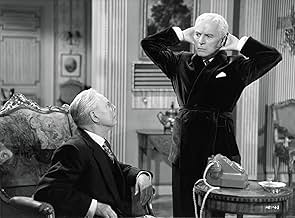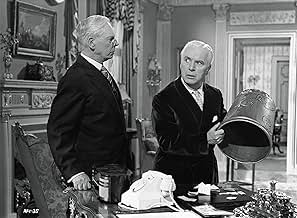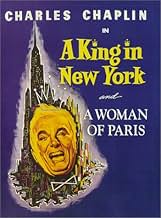AVALIAÇÃO DA IMDb
7,0/10
9,4 mil
SUA AVALIAÇÃO
Adicionar um enredo no seu idiomaA recently-deposed European monarch seeks shelter in New York City, where he becomes an accidental television celebrity and is later wrongly accused of being a Communist.A recently-deposed European monarch seeks shelter in New York City, where he becomes an accidental television celebrity and is later wrongly accused of being a Communist.A recently-deposed European monarch seeks shelter in New York City, where he becomes an accidental television celebrity and is later wrongly accused of being a Communist.
- Prêmios
- 1 vitória e 1 indicação no total
Avaliações em destaque
A King In New York was a pure delight to watch. Seeing perhaps the greatest actor of the first half of the century is always a treat and he doesn't disappoint in this film. Chaplin made this satire as a shot at the United States, who only five years earlier had denied him re-entry into the country. This was based on the fact he wouldn't come before the McCarthy hearing and make a statement on his supposed ties to the Communist party. Regardless of the basis for this film's comedy pieces, one can find a few moments where Chaplin is taking a direct shot at those who had doubted him.
The plot involves Chaplin as King Shadov, a ruler of a ficticious country whose people have ousted him based on his unwillingness to manufacture Atomic Bombs. He would rather spend the taxpayers money on finding ways to create atomic energy. Obviously this is a deliberate analogy of Chaplin being thought of as a communist although the complete opposite was the truth. So, the exiled leader goes to America in search of a fun vacation in which he can experience the excitement that he had heard about so many times before. The viewer follows Shadof and his trust aide throughout New York City and their many hilarious experiences. The best of which that come to mind are the scenes in which Chaplin pantomimes his order to a waiter who cannot hear him, the scene in which Chaplin recites the famous "to be or not to be" soliloque from Hamlet to guests at a dinner party and the scene in which Chaplin gets his finger stuck in a fire hose and cannot get it out.
One can see some elements of the tramp in Chaplin in this film including the facial expressions, his smile and the way he moves about gracefully. I had never seen Chaplin in a talking film before this one and was somewhat surprised to see how much of a great talking actor he truly is. For an actor who had done so much in silent films and only silent films, this film shows that Chaplin is one of the top actors of this century.
The only element of this film that somewhat disappointed me was the manner in which the hearings were brushed off. I believe that there was plenty of room for some gags to be thrown in here. Perhaps Chaplin felt as if he had already taken enough shots and didn't need to exploit this area.
This film is yet another example of the Chaplin greatness and I would recommend it to anyone who loves films or are interested in seeing film making magic.
8/10 stars.
The plot involves Chaplin as King Shadov, a ruler of a ficticious country whose people have ousted him based on his unwillingness to manufacture Atomic Bombs. He would rather spend the taxpayers money on finding ways to create atomic energy. Obviously this is a deliberate analogy of Chaplin being thought of as a communist although the complete opposite was the truth. So, the exiled leader goes to America in search of a fun vacation in which he can experience the excitement that he had heard about so many times before. The viewer follows Shadof and his trust aide throughout New York City and their many hilarious experiences. The best of which that come to mind are the scenes in which Chaplin pantomimes his order to a waiter who cannot hear him, the scene in which Chaplin recites the famous "to be or not to be" soliloque from Hamlet to guests at a dinner party and the scene in which Chaplin gets his finger stuck in a fire hose and cannot get it out.
One can see some elements of the tramp in Chaplin in this film including the facial expressions, his smile and the way he moves about gracefully. I had never seen Chaplin in a talking film before this one and was somewhat surprised to see how much of a great talking actor he truly is. For an actor who had done so much in silent films and only silent films, this film shows that Chaplin is one of the top actors of this century.
The only element of this film that somewhat disappointed me was the manner in which the hearings were brushed off. I believe that there was plenty of room for some gags to be thrown in here. Perhaps Chaplin felt as if he had already taken enough shots and didn't need to exploit this area.
This film is yet another example of the Chaplin greatness and I would recommend it to anyone who loves films or are interested in seeing film making magic.
8/10 stars.
Now, I've yet to see A COUNTESS FROM HONG KONG, but out of Chaplin's full-length talkies, I didn't find A KING IN NEW YORK terrible by any stretch. In fact-- and I might lose cinephile points for admitting it-- I'd take this over the more prestigious LIMELIGHT any day! It's less self-indulgent and self-loving, and the satire of American media culture still mostly works.
Why does this get so much hate? Maybe it's the film's roughness. It's clearly set-bound and those sets do look cheap most of the time. But money can't buy inspiration, and I think this movie has more than enough inspiration to make up for its lesser production values. Many of the vignettes are delightful and the bittersweet edges (the subplot with Shadov's estranged queen, the character arc of the philosophical young boy) lend this film a great deal of memorability.
Why does this get so much hate? Maybe it's the film's roughness. It's clearly set-bound and those sets do look cheap most of the time. But money can't buy inspiration, and I think this movie has more than enough inspiration to make up for its lesser production values. Many of the vignettes are delightful and the bittersweet edges (the subplot with Shadov's estranged queen, the character arc of the philosophical young boy) lend this film a great deal of memorability.
Am a big fan of Charlie Chaplin, have been for over a decade now. Many films and shorts of his are very good to masterpiece, and like many others consider him a comedy genius and one of film's most important and influential directors.
It is hard to not expect a lot with all his feature films between 'The Kid' and 'Limelight' being very good to masterpieces. On that front Chaplin's penultimate film 'A King in New York' disappoints a little. As far as his feature films go it is one of his weaker ones, being nowhere near the standard of 'The Gold Rush', 'The Kid', 'Modern Times', 'The Great Dictator' and especially 'City Lights'. As far as his overall career goes it is nowhere near among his worst, including his early career short films it is much better than the worst of his Keystone period and even his much improved Essanay period had a couple of lacklustre ones. He also did a couple of historical curios and patchworks that this is also superior to.
'A King in New York' has its problems. It is one of his least visually refined feature films. Some of the camera work and editing are rough and the evoking of New York is not very convincing at all, it was made in England rather than being authentic and it is very obvious it was not shot in New York.
Chaplin also lays it on far too thick with the political elements which, while admirably cutting and personal, felt very heavy-handed and not always needed. Especially what is said from the young boy. Chaplin is no stranger to including politics in his films and short films and they are not subtle, but it comes over as very bitter and aggressive here in a way that wasn't there previously. A few parts go on too long too and could have been trimmed
However, the music is good, neither intrusive or out of place. Chaplin does give a typically great performance and the supporting cast acquit themselves well too. Chaplin is not at his most inspired in the directing but the expertise is still there and handled well.
The film is never dull either, while the satirical element is sharp, the comedy is genuinely funny, there is some very thought-provoking insight and there is some sentiment/pathos that is very touching while not being over-the-top or overused.
Summing up, good but didn't blow me away. 7/10 Bethany Cox
It is hard to not expect a lot with all his feature films between 'The Kid' and 'Limelight' being very good to masterpieces. On that front Chaplin's penultimate film 'A King in New York' disappoints a little. As far as his feature films go it is one of his weaker ones, being nowhere near the standard of 'The Gold Rush', 'The Kid', 'Modern Times', 'The Great Dictator' and especially 'City Lights'. As far as his overall career goes it is nowhere near among his worst, including his early career short films it is much better than the worst of his Keystone period and even his much improved Essanay period had a couple of lacklustre ones. He also did a couple of historical curios and patchworks that this is also superior to.
'A King in New York' has its problems. It is one of his least visually refined feature films. Some of the camera work and editing are rough and the evoking of New York is not very convincing at all, it was made in England rather than being authentic and it is very obvious it was not shot in New York.
Chaplin also lays it on far too thick with the political elements which, while admirably cutting and personal, felt very heavy-handed and not always needed. Especially what is said from the young boy. Chaplin is no stranger to including politics in his films and short films and they are not subtle, but it comes over as very bitter and aggressive here in a way that wasn't there previously. A few parts go on too long too and could have been trimmed
However, the music is good, neither intrusive or out of place. Chaplin does give a typically great performance and the supporting cast acquit themselves well too. Chaplin is not at his most inspired in the directing but the expertise is still there and handled well.
The film is never dull either, while the satirical element is sharp, the comedy is genuinely funny, there is some very thought-provoking insight and there is some sentiment/pathos that is very touching while not being over-the-top or overused.
Summing up, good but didn't blow me away. 7/10 Bethany Cox
... while he himself was basically exiled in a strange land. 1957's "A King in New York" shows Chaplin at the end of his film career. In fact, it is the last film in which Chaplin himself stars. Refused permission to reenter the U.S. in 1952 due to the idea that he held anti-American beliefs, he actually made this film about a deposed European king in New York in England. The film suffers from production values that are not as high as they were in Chaplin's earlier films, and if you have the version Warner Brothers put out in 2004, the commentary points out that Chaplin had much trouble making this film mainly because he was not dealing with familiar personnel in his own studio as he had in his earlier efforts. The film's political statements are heavy-handed, but there are still some good comic turns by Chaplin and his viewpoints and comic bits on America and rampant commercialism and consumerism still hold up today. In fact, they are probably much more relevant today than they were when this movie was first made.
If you are curious about Chaplin's work you need to eventually view this film, just don't start your journey here. If you are just starting out, I recommend you view Chaplin's Mutual Comedies. These are 12 two-reel comedies Chaplin made in 1916 and 1917 and show his comic technique evolve from the pants-kicking fests of his Essanay and Keystone films into the sophisticated technique he had from the end of the series onward. Also, the Mutual period was named by Chaplin himself as the era in both his personal and professional life in which he was the happiest.
If you are curious about Chaplin's work you need to eventually view this film, just don't start your journey here. If you are just starting out, I recommend you view Chaplin's Mutual Comedies. These are 12 two-reel comedies Chaplin made in 1916 and 1917 and show his comic technique evolve from the pants-kicking fests of his Essanay and Keystone films into the sophisticated technique he had from the end of the series onward. Also, the Mutual period was named by Chaplin himself as the era in both his personal and professional life in which he was the happiest.
Someone once described "A King in New York" as the worst film ever made by a major artist. I can think of many worse examples and while this late Chaplin picture may lack the genius of his earlier work, (it was his penultimate film; he made it several years after "Limelight" and before "A Countess from Hong Kong"), it is an often very funny satire on what Chaplin perceived as 'the modern age'. Driven out of America by McCarthyism, Chaplin constructed his New York in a British studio and typical of its writer, director, star and composer it makes no apology for its attack on right-wing politics, in particular the HUAC, as well as television, Cinemascope and plastic surgery. It's also less sentimental than it might have been, (always Chaplin's biggest fault), but the plot involving a child played by Chaplin's own son Michael, does the film no favours. On the other hand, Chaplin himself is superb and Dawn Adams is surprisingly good as a television star. No masterpiece, then but not quite the disaster some people have said of it either.
Você sabia?
- CuriosidadesThe first film that Sir Charles Chaplin made in the UK after his exile from America, and his last leading role in a movie.
- Erros de gravaçãoDuring his diatribe, Rupert claims that the Roman Empire fell with the assassination of Caesar. Caesar's assassination occurred 17 years before the Roman Empire was established.
- Citações
[after being told that the political turmoil in America is just a "passing phase."]
King Shahdov: Quite so. In the meantime, I'll sit it out in Europe.
- Versões alternativasOriginal British prints run about five minutes longer than the version that was released in America in 1976. It is this American version that is available on video, but the British cut is available on disc.
- ConexõesEdited into Histoire(s) du cinéma: Fatale beauté (1994)
Principais escolhas
Faça login para avaliar e ver a lista de recomendações personalizadas
- How long is A King in New York?Fornecido pela Alexa
Detalhes
- Data de lançamento
- Países de origem
- Centrais de atendimento oficiais
- Idioma
- Também conhecido como
- Un rey en Nueva York
- Locações de filme
- Empresa de produção
- Consulte mais créditos da empresa na IMDbPro
Bilheteria
- Faturamento bruto mundial
- US$ 910
- Tempo de duração1 hora 50 minutos
- Cor
Contribua para esta página
Sugerir uma alteração ou adicionar conteúdo ausente




































